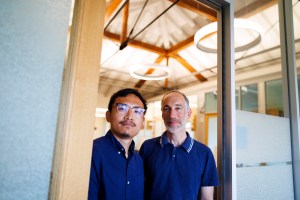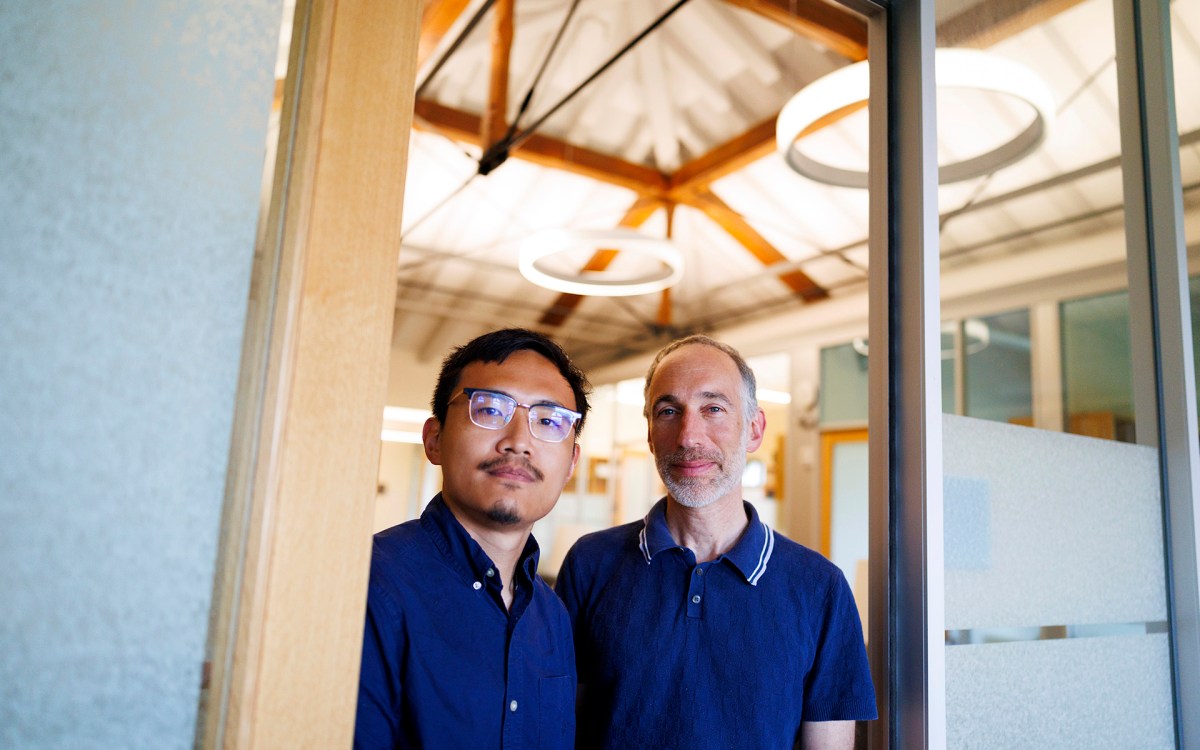Rose Lincoln/Harvard News Office
Chu urges U.S. to anticipate its energy future
Energy Secretary delivers HKS speech
U.S. Energy Secretary Steven Chu described the U.S. failure to anticipate changes in the global energy supply during a talk at the John F. Kennedy School of Government Aug. 6.
Chu cited the discovery of lithium batteries as just one of the many advanced
technologies that the United States has surrendered over the decades to others
in Europe and Asia.
“Weinvented lithium batteries,” Chu said, “but they were made commercially viable by Sony,” with the United States as one of its biggest importers.
Stealing a hockey metaphor during his public talk “Laying the Foundation for the Next Generation of Clean Energy Jobs,” Chu asked: “Are we skating to where the puck will be?
“Around the globe, countries are realizing that business as usual will not do,” the secretary said. “I remind you about what Wayne Gretzky answered whenever someone asked him why he was such a good hockey player. He said, ‘I position myself on the ice by skating to where the puck is going to be, not where it has been.’” Not what the United States is doing, acknowledged Chu.
With U.S. oil production declining steadily since the 1970s, the United States now imports 60 percent of its crude oil. While China spends over $12 million an hour on new energy technology in hopes of becoming a green technology leader, the United States keeps falling behind in that area.
The talk also featured U.S. Rep. Edward J. Markey, chair of the Select Committee on Energy Independence and Global Warming and co-author, with Rep. Henry Waxman, of the most recent carbon cap-and-trade bill, which passed the House last month.
Outside the Harvard Kennedy School, a dozen demonstrators held up red and yellow signs that read “Stop Climate Change Now.” The demonstrators, volunteers from Greenpeace and the Global Warming Education Network, came from Massachusetts and Washington, D.C., to rally in favor of “a stronger negotiation for a climate treaty in Copenhagen,” where a U.N. climate summit is scheduled this December.
“We are here to try to encourage President Obama to do more to help slow climate change by cutting carbon dioxide emissions more dramatically than he is currently attempting to,” one demonstrator said.
Inside, Chu and Markey addressed a packed John F. Kennedy Jr. Forum. Chu said that in 10 or 20 years, the world will have high oil prices, newly developed countries demanding more resources than they do today, and a carbon-constrained reality where climate change will be undeniable. Facing that sort of future, Chu lamented the skepticism with which climate change is still met in Washington.
“Some people believe that climate isn’t changing. A number of policy makers have told me, ‘well, in the last five years the Earth has been cooling.’ Notice how dramatically the Earth has been ‘cooling down,’” Chu remarked, pointing at data depicting the opposite. “We have an expression at the Department of Energy: Everyone is entitled to their own opinion; they are not entitled to their own facts.”
Chu cited facts such as a faster rise in sea levels than climate forecasts had predicted 15 years ago, the acceleration of ocean warming, and evidence of the loss of glacier ice packs around the world.
“This is where we are today,” Chu said.
A business-as-usual scenario, Chu warned, would include a dramatic increase in heavy downpours as climate change brings about more precipitation. Other changes could threaten agriculture; fertile land could become desert. The United States will not be spared from this, he added.
The United States should aim for increased energy efficiency and decreased energy consumption, Chu said. He emphasized that the only initiatives he and his team would entertain are ones that can pay for themselves over a lifetime investment rather than those that are good, yet more costly.
“It’s possible to decrease energy consumption in America by 23 percent by 2020,” Chu said. “The Waxman-Markey [bill] calls for a 17 percent decrease,” he said.
Though Waxman-Markey seeks a 17 percent decrease in energy consumption, some say the legislation isn’t ambitious enough.
“The science demands that, as a group, these countries need to cut emissions to 40 percent below 1990 levels by 2020,” reads a statement on the Greenpeace Web site. “Unless they raise their game considerably over the next six months, the world will be heading for a global temperature rise of 3 degrees Celsius and the distinct possibility of irreversible climate impacts. … Something has to change.”
In a question-and-answer session at the end of the event, a woman from the Massachusetts Coalition for Healthy Communities asked why no one is talking about the 1 percent reduction in carbon dioxide emissions –which wouldn’t avoid the bleak scenario of even a 2 degree warming – that would result from the bill.
Markey conceded that the United States is behind in its efforts but said the nation has the ability to catch up quickly.
“We moved from black rotary dial phones to Blackberry very quickly,” Markey said. “We moved from narrowband to broadband very quickly. People underestimate how quickly we’re going to move to this new revolution once we put the market incentives in place and fund basic research. I think we’re going to have a very rapid response. I’m an optimist.”
Exceeding the Waxman-Markey benchmark, Chu said, is in the hands of the American people. Transitioning to white or light-colored roofs, for example, which can reflect solar radiation back into space, would decrease air conditioning bills by 20 percent and be the equivalent to taking all the cars in the world – a billion vehicles – and keeping them off the road for 11 years.
Americans should also support the design of what Chu called highly automated buildings, analogous to computerized cars with microprocessors measuring different variables to help control and increase energy efficiency.
“The garage mechanic doesn’t know what the vehicle’s computer is doing and neither does the driver. But it doesn’t matter. It works,” Chu said.
Markey’s optimistic sentiment was shared by members of the audience composed of students, retired elementary school teachers, energy consultant groups, Harvard alumni, and even high school summer students like British siblings Tara and Philip Elsen, who were eager to hear Chu’s perspective and learn “what Obama is doing in America.”





